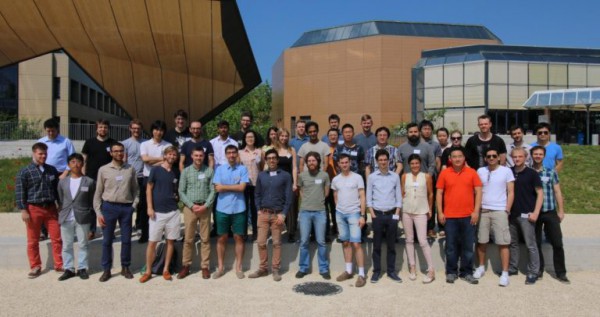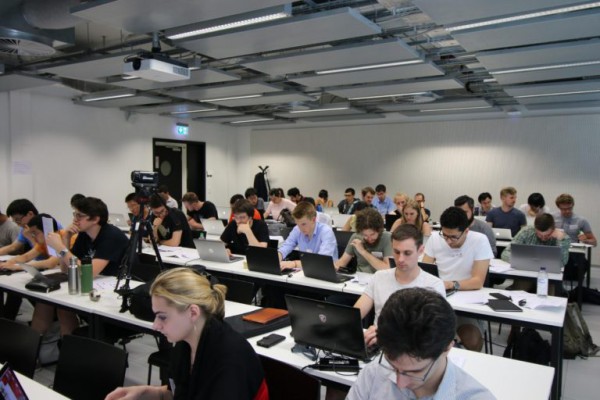More than 90% participants would recommend colleagues to attend a similar tutorial using AiiDA
Nathalie Jongen & Giovanni Pizzi, EPFL, NCCR MARVEL, 21.07.2017
High-throughput computing (HTC) is emerging as an effective methodology in computational materials science for the discovery of novel materials and the optimisation of selected properties. Its adoption is spreading rapidly at the point that HTC is becoming an essential tool for computational materials scientists.

Group picture, AiiDA Tutorial, EPFL May 2017
During the hands-on sessions, the participants worked either on their own laptop, or on laptops provided by EPFL. Each session was always introduced by the instructors, who briefly explained the aim of the session. The detailed instructions on the tasks to achieve were then provided on a printed booklet (and also on a PDF file), so that all could learn at their own pace. Some hands-on sessions were supported with jupyter-notebooks, which the participants had to adapt. Eight instructors plus the organizers were available throughout all sessions to answer specific questions from the participants. Participants looked extremely interested and thrilled in learning the code.

AiiDA Tutorial participants at work during the hands-on sessions
The workshop was also focused more generally on teaching general techniques to be used in high-throughput calculation, independent of the code used. For this reason, four experts active in the domain of high-throughput simulations were invited (Dr. Thomas Bligaard, Prof. Stefano Sanvito, Prof. Chris J. Pickard and Prof. Marco Fornari). All speakers discussed extremely interesting results from their research, showing in particular how they performed computational searches of materials inside known classes, how filtering of results could be achieved to reduce the number of candidates and perform very expensive calculations only on a subset of them, and explaining methods that can be applied to extract information from simulations using machine-learning techniques.
During the discussion sessions, each participant was encouraged to ask questions either on technical questions on the AiiDA code or, more generally, on his/her personal high-throughput research. The participants thoroughly discussed among themselves on different ways to solve common problems encountered when running large numbers of simulations.
Ten posters were presented during in the evening of the first day together with a standing dinner, this further stimulated discussions and exchange between participants.
The feedback received from the participants was extremely positive: 92.8% of the participants declared that they would strongly recommend their colleagues to participate to a similar tutorial on high-throughput computations using AiiDA.
Finally, thanks to the generous support of funding entities (Psi-K, MARVEL and MaX), it was possible to provide financial support for the accommodation in a hotel on campus to 11 participants. This support made it possible for some participants to take part to the tutorial.
Read the whole story with all the technical details.
More photos are available on the AiiDA Facebook page.
Low-volume newsletters, targeted to the scientific and industrial communities.
Subscribe to our newsletter